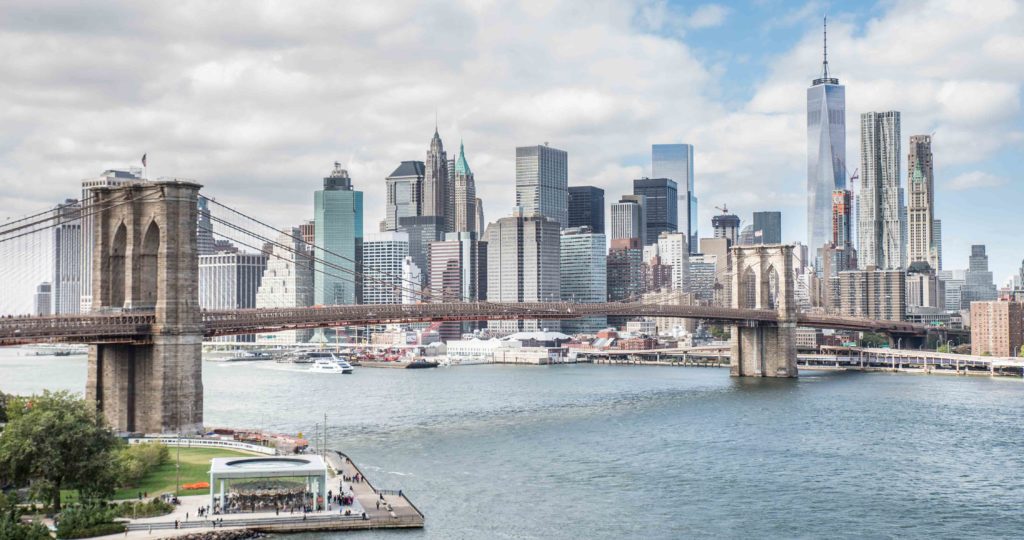New York City is the most populous city in the United States. With all those residents, businesses, events, and visitors comes waste, lots of waste.
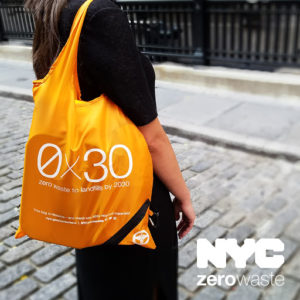
Source: www1.nyc.gov
The good news is that the amount of waste that NYC produces is on the decline, with curbside pickups reducing the waste stream from almost 3.5 million tons in 2005 to less than 3.1 million tons in 2017—a drop that occurred while the population of the city grew by more than 300,000 people.
While this figure only accounts for residential waste, representing a small percentage of the roughly 14 million tons of waste and recyclables NYC throws from its homes, businesses, schools, streets, and construction sites every year, major changes in governmental policies, numerous commercial innovations and a growing number of community initiatives, are pushing for a cleaner and greener city.
In fact, New York City is at the forefront of sustainable cities, and its goal to reach zero waste by 2030 is among the most ambitious in the world. Explore what the city is doing to reach that goal and how both communities and businesses are tackling climate change as they work towards zero-waste lifestyles and communities.
OneNYC — Zero Waste in NYC
Arguably, the City of New York’s innovative OneNYC plan is the overarching framework for this push towards zero waste. Presented in 2015 with the aim of making NYC healthier, happier, and more sustainable by 2050, it includes the goal of sending zero waste to landfills by 2030 and is one of the most substantial zero waste proposals in the world.
The program saw numerous changes to the city’s waste management systems in 2016 that have had lasting impacts, and initiatives such as the GrowNYC and the DonateNYC have also fallen under the plan’s goals, both indirectly contributing to zero-waste goals. Some of the more impressive steps towards a zero-waste NYC under this scheme are:
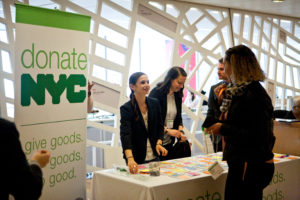
Source: 1.nyc.gov
- The Zero Waste Challenge NYC
- Mandatory commercial recycling
- Commercial organic waste rules
- Banning plastic bags
- Developing zero waste schools
The Zero Waste Challenge NYC
One of the most notable initiatives was the Zero Waste Challenge, a proof of concept for the city’s broader commitment to reduce commercial waste disposal by 90% by 2030. The initiative ran in 2016 and was aimed at large waste-generating businesses such as hotels, arenas, food wholesalers and manufacturers, commercial building owners, and others.
The companies that took part had to divert at least 50% of their waste from landfill and incineration in just five months, as well as divert food waste to feed New York’s hungry. More than 31 businesses at 39 locations across all five boroughs took up the challenge with great success. There was nearly 37,000 tons of material diverted, including over 24,500 tons of organic material composted and 322 tons of food provided to New Yorkers in need.
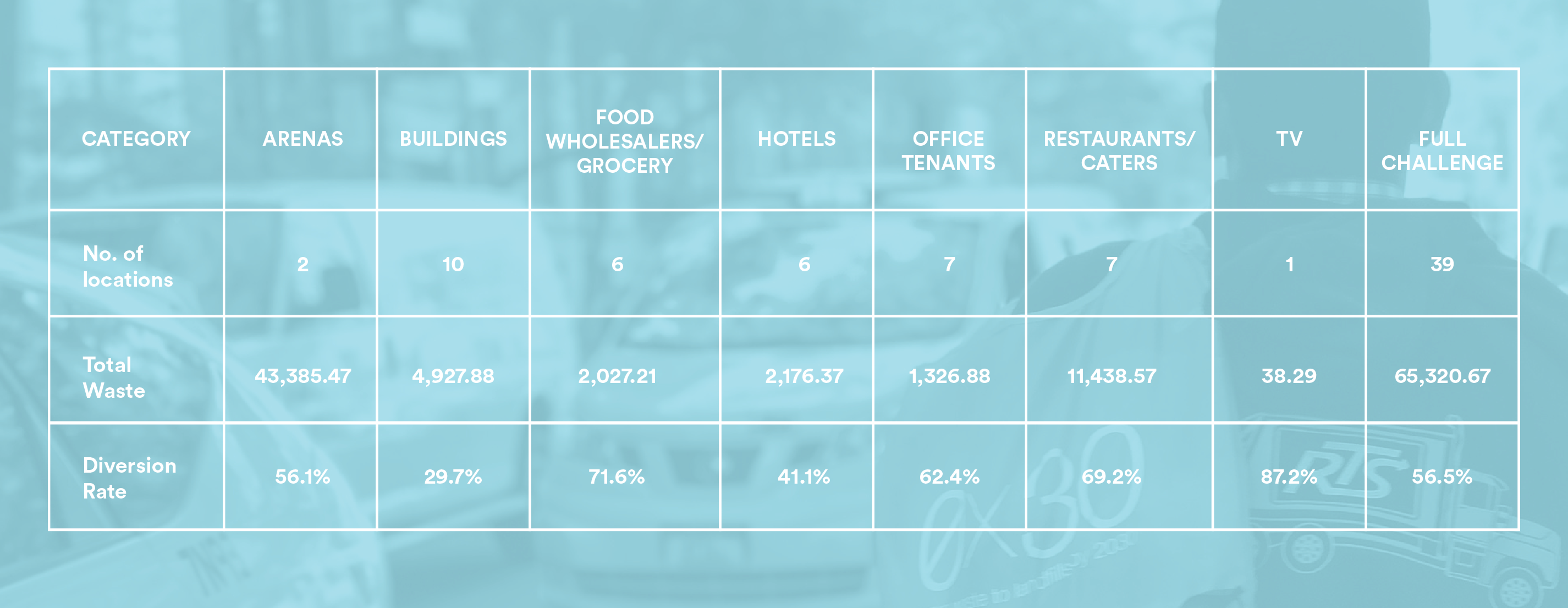
Data Taken from Final Zero Waste Challenge Report
The companies that took part in the challenge included major brands in the city such as Whole Foods Market, which achieved greater than a 50% diversion rate at two separate locations, with an almost 10% increase through on-site educational programs.
Mandatory Commercial Recycling
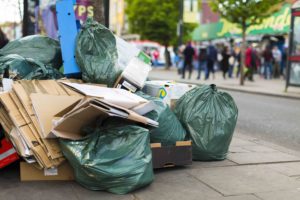 The Zero Waste Challenge NYC acted as a kickstarter for the city, with mandatory recycling also being introduced in 2016. This meant that all businesses had to recycle metal, glass, plastic, beverage cartons, paper, and cardboard, and “ensure to the best of their ability that these recyclable materials are properly handled by their private carter.”
The Zero Waste Challenge NYC acted as a kickstarter for the city, with mandatory recycling also being introduced in 2016. This meant that all businesses had to recycle metal, glass, plastic, beverage cartons, paper, and cardboard, and “ensure to the best of their ability that these recyclable materials are properly handled by their private carter.”
Businesses in NYC must now contract a private carter and develop a plan for how waste will be collected and distributed, with signage to indicate source-separated collection, co-collection, or single-stream collection. Additionally, they must now have disposal stations for customers and staff that are labeled and separate from regular garbage.
Commercial Organics Rules in NYC
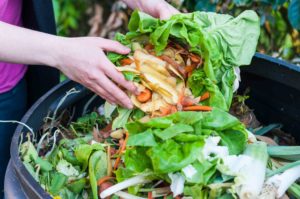 In addition to recycling, the NYC Department of Sanitation’s (DSNY) Commercial Organics Rules came into effect that same year, which required affected businesses to “separate staff-handled, back of house food scraps, plant trimmings, food-soiled paper, and certified compostable products from garbage and other recyclables.” This was again to be handled by a private carter capable of dealing with organics collection and composting.
In addition to recycling, the NYC Department of Sanitation’s (DSNY) Commercial Organics Rules came into effect that same year, which required affected businesses to “separate staff-handled, back of house food scraps, plant trimmings, food-soiled paper, and certified compostable products from garbage and other recyclables.” This was again to be handled by a private carter capable of dealing with organics collection and composting.
In 2016, these composting rules applied to a limited number of large businesses, but they were further strengthened in 2018 and again in 2020. The latest update increased the scope of the program significantly and aims to divert a further 100,000 tons of food waste away from landfills each year. The updates came after it was discovered that facilities have the capacity to deal with more material than previously thought, and includes progressively smaller businesses to build a comprehensive zero-waste system.
NYC Zero Waste Bag Ban
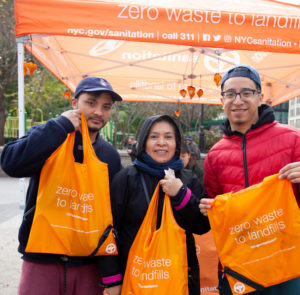
Source: timeout.com
In 2015, OneNYC identified that single-use plastic bags made up 2.3% of the city’s total waste, costing nearly $10 million every year to send them to landfill. They also noted that plastic bags were a major component of street litter, which clogged drains, jammed the city’s recycling facilities, and polluted New York Harbor.
In March 2020, New York State rolled out a comprehensive ban prohibiting retailers from distributing plastic bags from October 2020. The bag ban does have exemptions for businesses, but most bags now sold are subject to strict guidelines including the weight they hold, the thickness of the material, and the number of uses, among other criteria.
Zero Waste Schools NYC

Source: http://dsny.cityofnewyork.us/
While the DSNY is behind the bulk of governmental zero-waste initiatives in NYC, they are collaborating with the Department of Education (DOE) to teach the next generation of zero-waste ambassadors. At the time of the OneNYC zero-waste pledge, schools in New York were generating 40,000 tons of refuse a year. The goal put forward in the proposal was to set up the required infrastructure and educate the city’s 1.1 million students about waste in order to have 100 Zero Waste Schools in just 5 years, which would act as a flagship, with the hopes of including all schools by 2030.
These changes are in progress, with schools now required by law to introduce recycling programs in classrooms, cafeterias, offices, and anywhere that trash is generated. Much like businesses, this recycling must be sorted into separate bins in waste sorting stations that are clearly labeled. Schools must also appoint a Sustainability Coordinator who is responsible for creating annual sustainability plans with waste reduction and recycling goals.
Commercial and Community Innovation
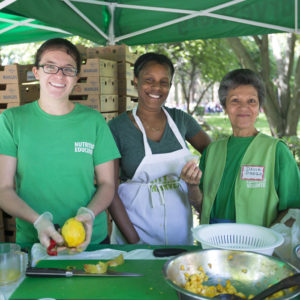
Source: cityharvest.org
If any city is a trendsetter, it’s New York, so it’s no surprise that many businesses in NYC are heading toward zero waste in conjunction with the ongoing governmental efforts. There are far too many operations to list out individually, but there are a few worth noting we’ll take a closer look at:
- Rhodora Wine Bar, a zero-waste restaurant in NYC
- City Harvest, a community food waste distribution program
- Bulk Stores and Loop, an innovative solution with major brands
- Kaiyo, a very New York solution to furniture waste
Food Waste Solutions in NYC
Nationally, food waste makes up 22% of municipal solid waste (MSW), so cutting back on this is a big step towards creating a zero-waste NYC. While governmental composting initiatives are helping, the Rhodora Wine Bar in Brooklyn is striving to become the first zero-waste restaurant in NYC.

They aim to “send absolutely nothing to landfill” with no single-use plastics used or even allowed into the venue. What’s more, Rhodora Wine Bar has committed to only sourcing products (food, beverages, and operations) that can be either recycled, upcycled, or composted.
There are also numerous zero-waste community initiatives, from neighborhood clothes-swaps to city-wide solutions to feed the hungry. One notable solution helping create a zero-waste NYC and tackle food waste is City Harvest.
City Harvest was founded in 1982 with the aim of tackling NYC’s abundance of excess food while certain residents still suffered from food insecurity. The project collects surplus food, thus reducing food waste, and distributes it to those who need it, embracing circularity and contributing to a zero-waste NYC. In one year, the organization can rescue 109 million pounds of food before delivering it across the five boroughs, and now operates 22 trucks, 160 staff, thousands of volunteers, and a Food Rescue Facility.
Zero Waste Stores in NYC
While it’s great to see restaurants and bars moving towards zero waste in NYC, most people cook and eat at home. Unsurprisingly, there are many stores in the city for zero-waste consumers, offering everything from refillable household cleaners to herbs, spices, and grains. Most of these stores operate a “package-free” policy by offering goods in bulk from which you can fill your own reusable containers.
New York is also home to the pilot for Loop, a project which has partnered with numerous major brands to deliver products to people’s doors in reusable packaging. With Loop, a 100% refundable deposit is used to “borrow” packaging, which the company then cleans and reuses once you’re done.

Source: purewow.com
Products from brands like Tide, Febreze, Gillette, Häagen-Dazs, and many others are delivered with reusable packaging inside an insulated tote bag, which you then put your used containers in to be collected. Since the pilot in 2019, it has grown and is now available in multiple countries around the world—with more expected next year.
A large part of going zero waste is reusing, repairing, or repurposing goods, and there are now many platforms that allow you to give away, swap, or sell your old products. However, New York does it in style with Kaiyo, an online marketplace for higher-end furniture.
The company aims to connect “a love of great design with a greater love for our environment by keeping furniture out of landfills and in our homes for as long as possible.” Kaiyo has embraced circularity in furniture with some success, claiming to have kept 1,650,085 pounds out of landfill while also planting a tree for every order completed on the platform.
On the topic of repair and reuse, it’s also important to remember that the whole city is dotted with small shops that offer exactly these services—tailors, cobblers, and hatters still exist if you spend the time to find them.
With these initiatives and programs, New York is taking big steps towards sustainability, and as more consumers, businesses, and governmental departments are brought on board, the future looks to be waste-free for NYC!
For more information on zero waste and how you can start implementing it in your home or business, subscribe to zerowaste.com or follow the Zero Waste Blog. For further insight into how your business can work towards zero waste, arrange a chat with one of our TRUE Advisors.

